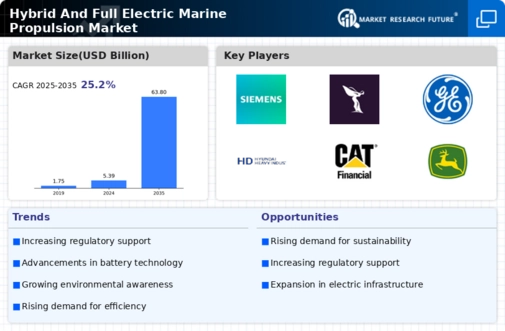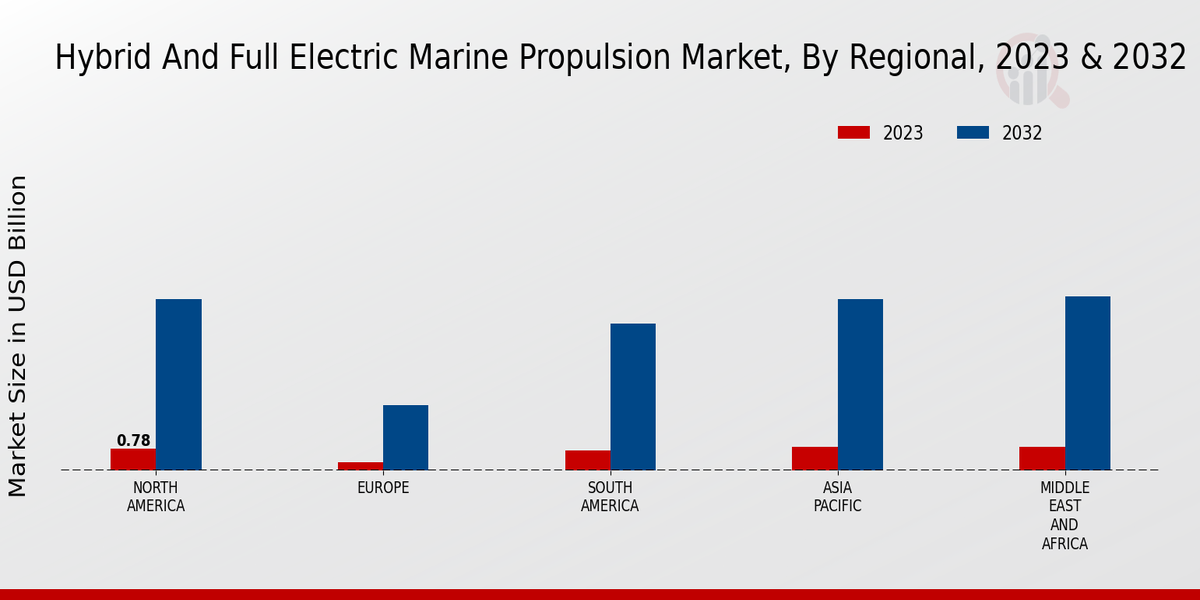Economic Incentives
Economic incentives provided by governments are playing a crucial role in the expansion of the Global Hybrid And Full Electric Marine Propulsion Market Industry. Many countries offer subsidies, tax breaks, and grants to encourage the adoption of cleaner marine technologies. For instance, the European Union has introduced funding programs aimed at supporting the transition to sustainable shipping practices. These financial incentives lower the initial investment barriers for shipowners and operators, making hybrid and electric propulsion systems more accessible. Consequently, this trend is likely to contribute to a compound annual growth rate of 25.18% from 2025 to 2035.
Environmental Regulations
The Global Hybrid And Full Electric Marine Propulsion Market Industry is experiencing a surge in demand due to increasingly stringent environmental regulations. Governments worldwide are implementing policies aimed at reducing greenhouse gas emissions and promoting cleaner technologies. For instance, the International Maritime Organization has set ambitious targets to halve emissions by 2050. This regulatory landscape encourages shipbuilders and operators to adopt hybrid and fully electric propulsion systems, which are perceived as more sustainable alternatives. As a result, the market is projected to reach 5.39 USD Billion in 2024, reflecting the industry's shift towards compliance with environmental standards.
Market Growth Projections
The Global Hybrid And Full Electric Marine Propulsion Market Industry is projected to experience substantial growth in the coming years. With a market value of 5.39 USD Billion in 2024, it is expected to reach 63.8 USD Billion by 2035. This growth trajectory indicates a compound annual growth rate of 25.18% from 2025 to 2035. Such projections highlight the increasing adoption of hybrid and electric propulsion systems across various marine applications, driven by technological advancements, regulatory pressures, and changing consumer preferences. This upward trend underscores the industry's potential to reshape the future of maritime transport.
Technological Advancements
Rapid technological advancements in battery and propulsion systems are driving the Global Hybrid And Full Electric Marine Propulsion Market Industry. Innovations in energy storage, such as lithium-ion batteries, have improved efficiency and reduced costs, making hybrid and electric systems more viable. For example, the development of solid-state batteries promises higher energy density and safety. These advancements not only enhance performance but also contribute to the overall reduction of operational costs for marine operators. As these technologies continue to evolve, the market is expected to grow significantly, potentially reaching 63.8 USD Billion by 2035.
Global Shipping Industry Transformation
The Global Hybrid And Full Electric Marine Propulsion Market Industry is undergoing a transformation as the shipping sector adapts to changing market dynamics. The industry is increasingly focusing on reducing operational costs and enhancing efficiency through the adoption of hybrid and electric systems. This transformation is driven by the need to remain competitive in a rapidly evolving market. As companies seek to optimize their fleets, the integration of advanced propulsion technologies becomes essential. This shift not only aligns with environmental goals but also positions the industry for future growth, as stakeholders recognize the long-term benefits of sustainable practices.
Growing Demand for Sustainable Shipping
The increasing demand for sustainable shipping solutions is a significant driver of the Global Hybrid And Full Electric Marine Propulsion Market Industry. Stakeholders, including consumers and businesses, are becoming more environmentally conscious, leading to a preference for greener alternatives in maritime transport. This shift is evident in the rising number of companies committing to sustainability goals, such as reducing their carbon footprint. As a result, shipbuilders are investing in hybrid and electric propulsion technologies to meet these expectations. This growing demand is anticipated to propel the market forward, aligning with global sustainability initiatives.























Leave a Comment